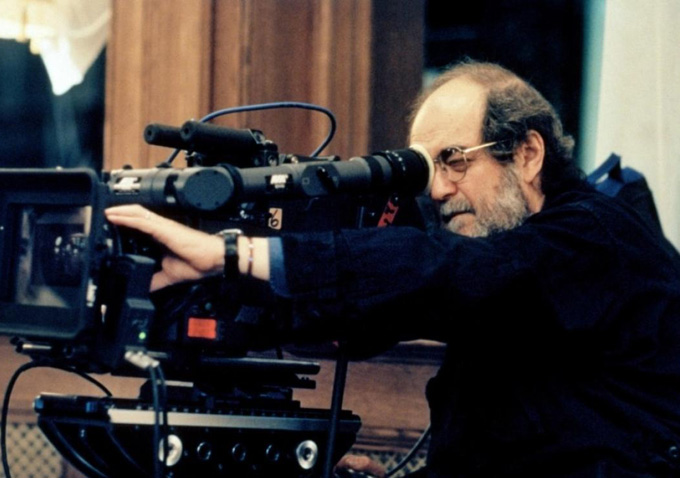 If you’re reading this website, you know Stanley Kubrick. You know he’s inarguably one of the most important filmmakers in the history of the medium, and you probably know that his attention to detail, sense of composition, and meticulous fixation over every aspect of his productions is virtually unmatched by any director, living or dead. What you may not know is that Kubrick’s life was just as fascinating as the films he made. A notorious recluse, perfectionist, and (some say) film-set dictator, he demanded nothing but the best out of everyone he worked with. Yet, in spite of his undeniable technical prowess, he has sometimes been accused of being a cold director, of viewing humanity from a God-sized distance. This claim is unfair and untrue for a number of reasons, chief being that his personality found a way into virtually all of his films. His doubt in humanity’s essential goodness (“A Clockwork Orange”), his creative pursuits and subsequent bouts of obsession (“The Shining”), and his penetrating curiosity about life beyond our immediate physical grasp (“2001: A Space Odyssey”) are just a few of the recurring motifs. The myth of Kubrick is almost as alluring as his cinematic body of work, but for those who remain curious, "The Invisible Man," a 51-minute documentary from 1996, has recently resurfaced to tell us more about the director.
If you’re reading this website, you know Stanley Kubrick. You know he’s inarguably one of the most important filmmakers in the history of the medium, and you probably know that his attention to detail, sense of composition, and meticulous fixation over every aspect of his productions is virtually unmatched by any director, living or dead. What you may not know is that Kubrick’s life was just as fascinating as the films he made. A notorious recluse, perfectionist, and (some say) film-set dictator, he demanded nothing but the best out of everyone he worked with. Yet, in spite of his undeniable technical prowess, he has sometimes been accused of being a cold director, of viewing humanity from a God-sized distance. This claim is unfair and untrue for a number of reasons, chief being that his personality found a way into virtually all of his films. His doubt in humanity’s essential goodness (“A Clockwork Orange”), his creative pursuits and subsequent bouts of obsession (“The Shining”), and his penetrating curiosity about life beyond our immediate physical grasp (“2001: A Space Odyssey”) are just a few of the recurring motifs. The myth of Kubrick is almost as alluring as his cinematic body of work, but for those who remain curious, "The Invisible Man," a 51-minute documentary from 1996, has recently resurfaced to tell us more about the director.
In the opening moments of the doc, Kubrick himself explains his deep love for camera technology—he describes the “sensual, tactile” material pleasures of the medium, and how his knowledge of photography enabled him to essentially make films on his own from the get-go. Obviously, as his public profile inflated and his budgets grew bigger, Kubrick could no longer afford to maintain the fiercely independent D.I.Y. philosophy that fueled his underrated early pictures—particularly the Kirk Douglas-starring “Spartacus” and his cynical, sparkling heist picture “The Killing.”
Kubrick’s fertile creative period in the 1970’s is also a highlight, covering everything from the near-perfect “Barry Lyndon”—this writer’s favorite, and one of the most widely misunderstood films of our time—to the contentious production of “The Shining,” where the director managed to drive Shelley Duvall to the brink of insanity (she even admits to “resenting him” due to how far he pushed her in some scenes) and alienate the author of the film’s source material, Stephen King. Indeed, it is hard to imagine anyone making films today in such a doggedly uncompromising fashion as Kubrick did in his prime, but his place in the canon of 20th-century filmmakers is impossible to deny. He was a true autodidact, a fast learner who controlled every single aspect of his films from the screenplay, location scouting, set construction, post-production, and even marketing and distribution (he very adamantly rejected Saul Bass’ posters for “The Shining”).
His death remains an incalculable loss for the film community, but his legacy remains with us in everything from the films of Paul Thomas Anderson (whose last picture, “The Master,” contained some nifty Kubrickian flourishes) to the recent documentary “Room 223,” which attempted to debunk the myriad of potential conspiracy theories embedded in the labyrinthine narrative of "The Shining."
“The Invisible Man” is a terrifically enlightening glimpse into the innermost workings of one of film’s most remarkable minds. It’s a must-see for any Kubrick devotee. Watch the whole thing below. [Refocused Media]

